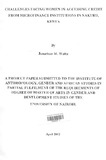| dc.description.abstract | MFIs provide their members with financial and social intermediation services to help improve their businesses. Despite a multitude of studies devoted to the topic, the challenges affecting women borrowers have never been critically highlighted and their impact on women SMES in relation to empowerment of women entrepreneurs. This remains largely unexplored in Kenya. This study therefore sought to bridge the gap by establishing the effect of microfinance intervention on empowerment of women entrepreneurs in Nakuru town in Kenya. It focused on two specific objectives: To determine what motivates the women entrepreneurs to borrow from MFIS, the second aim was to examine the challenges faced by women when accessing loans.
The population comprised 0[20 women entrepreneurs who had borrowed before from ECLOF Kenya. Purposeful sampling procedure was used to collect data from 20 members of ECLOF Kenya in the study area. Data was presented in the form of frequency distribution tables, graphs and pie charts which facilitated description and explanation of the study findings. Statistical Package for Social Scientists (SPSS) was used to generate frequency distribution tables. The findings showed that 60 per cent sited provision of collateral against as a major challenge when it comes to borrowing since of items required security for loan are owned by their husbands. 70 per cent argued that business performance made their loans be returned own made their loans be reduced. Environment and social cultural factors are also big embedment to access of loans by women.
This paper reviews rural and semi-urban women's access to financial services, a key factor of successful rural development strategies. Designing appropriate financial products for women to be able to borrow and invest is essential to strengthen women's role as producers and widen the economic opportunities available to them. For this purpose it is essential to understand how context specific legal rights, social norms, family responsibilities and women's access to and control over other resources shape their need for capital and their ability to obtain it. The paper argues that it is important that development strategies that aim to boost women's productive capacity must enhance' women's direct access to financial services, i.e. not mediated through their husbands. This paper is report on 'Challenges that women entrepreneurs face in accessing loans from Microfinance institutions'. The field research covered 20 women en enterpreneurs from Nakuru town, as well as further in-depth interviews with 10 key informants composed of leaders and practitioners in the micro finance industry. The recommendations are the result of a research paper conducted by the researcher in process of undertaking an academic paper in master study.
From this research it indicates that while each of the woman borrowers may face particular barriers from access to finance, there are also significant barriers to financing encountered by various women in business and intending to borrow. These barriers include, collateral requirements, business skills, cultural beliefs, and perception about women's borrowing all have significant effects on financing opportunity available to women. As such, while the focus of this project remains on investigating financing barriers faced by various women in accessing finance, for analytical purposes it was useful to contextualize these findings by situating them within the broader context of gender equality in relation to financing. | en_US |

